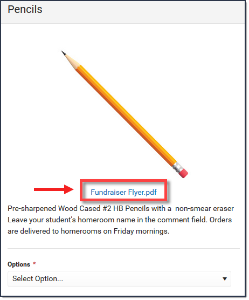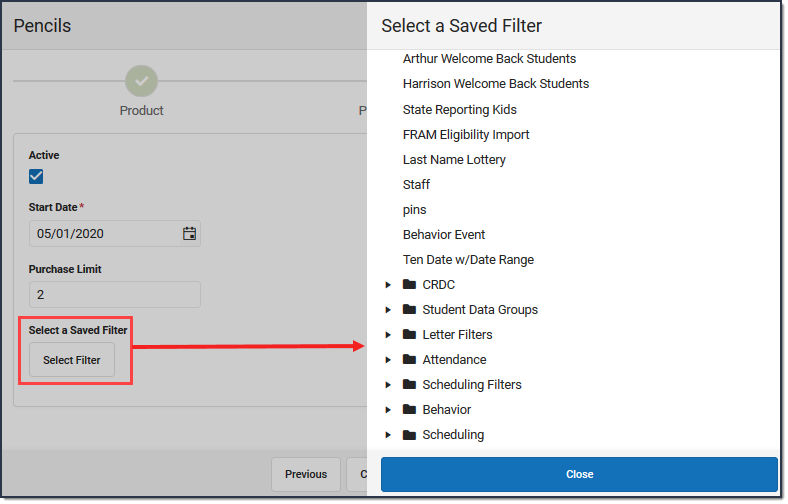The Infinite Campus School Store gives members of your school easy online access for purchasing goods and services. Each school in your district can have their own store. The stores display in Campus Parent and Campus Student.
This article walks you through the setup process step-by-step.
- Step 1. Enable School Store in the Digital Repository
- Step 2. Set Up Portal Self Service Options
- Step 3. Set up Product Types
- Step 4. Set up Fund Accounts
- Step 5. Create a Store for Each School
- Step 6. Set up Categories
- Step 7. Set up Products
Check with your System Administrator and make sure you have tool rights to System Administration > School Store.
Step 1. Enable School Store in the Digital Repository
Classic View: System Administration > Digital Repository
Search Terms: Digital Repository Preferences
Before you can set up the School Store, you must enable the School Store in the Digital Repository tool by marking the School Store checkbox at the bottom of the screen then clicking Save. For more information about the Digital Repository see the Digital Repository article on the Campus Community.
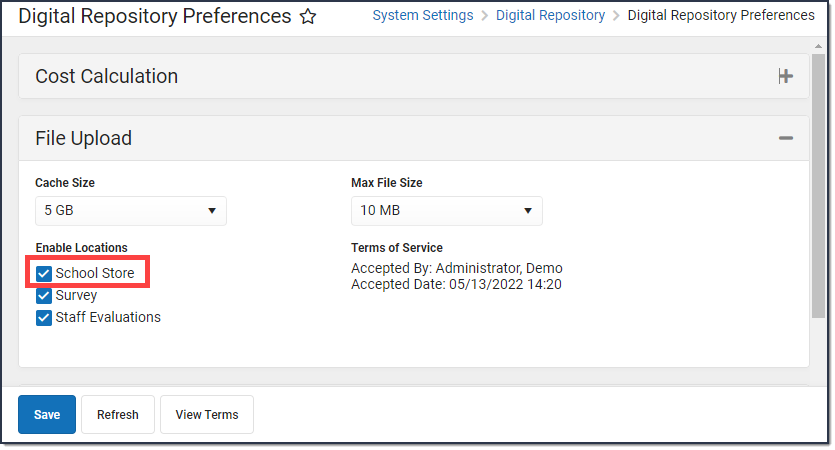
Step 2. Set Up Portal Self Service Options
Classic View: System Administration > Portal > Preferences > Self Services
For a parent to purchase an item in the School Store, the Activate Family Information Portal Self Service option must be selected as well as Display Household Member Contact Information OR Display Household Member Relationships.

Step 3. Set up Product Types
Tool Search: Product Types
About Product Types
Product Types are assigned to Products and to Fund Accounts. When a product is purchased, funds are deposited into the bank associated with the Fund Account to which you assigned the Product Type.
Important Information About Product Types
- Product Types are not unique for each school. Once a Product Type is added, it is available to every school in the district.
- You cannot delete a Product Type if it's tied to an active product in the Inventory. However, you can edit the Product Type.

Step 4. Set up Fund Accounts
Classic View: System Administration > Payments > Payments Setup > Fund Accounts
Search Terms: Payments Setup
Fund Accounts identify which bank accounts are used for items purchased in the School Store. You can manage Fund Account in the Payments Setup tool.
You can assign each Product Type to a unique Fund Account or group Product Types together on the same Fund Account.
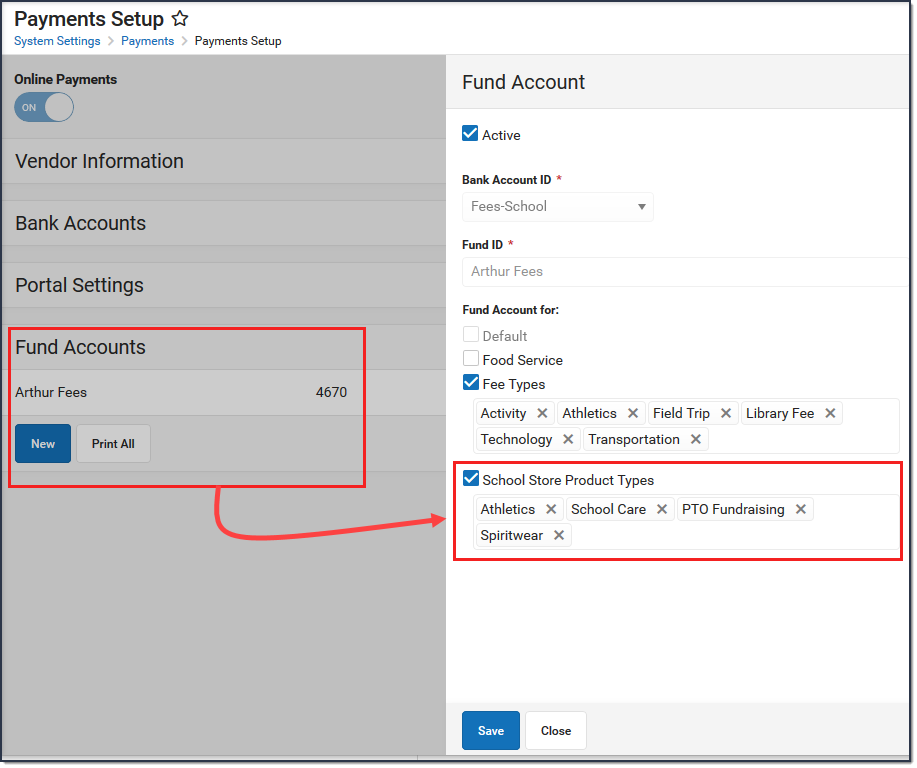
Step 5. Create a Store for Each School
Tool Search: Settings
The Settings tool allows you to choose where you want the School Store to display and set up different options for every store. From here you can also set up Public Store options. The Public Store is a website where anyone can shop for goods or services from your district.
Create a School Store
Create a store for each school by selecting the school in the Campus toolbar. Use the field descriptions provided here to complete the screen then click Save. Repeat this procedure for each school that is going to have a school store.

Field Descriptions (School Store)
| Field | Description |
|---|---|
| Store Display Name | The name of the store. |
| Public Store URL | The URL that is used to visit the Public Store. The URL is cannot be modified.
|
| Enable Store for | You can display the store in Campus Parent, Campus Student, Employee Self Service, or the Public Store. If you do not want the store to display, do NOT mark the checkbox. |
| Allow Free and Reduced Pricing | When this checkbox is marked, students that have an active eligibility record (FRAM > Eligibility) can be given a reduced price for items in the store. The reduced price is set up on the product. If you do not set up a reduced price, the student is charged the regular selling price. |
| Shop By Categories | This option allows you to set up the School Store for users to shop by category or by products.
|
| Add Parent Portal Description | Adds the text to the top of the Parent Portal School Store. |
| Add Student Portal Description | Adds the text to the top of the Student Portal School Store. |
| Store Logo Upload | A picture that represents the school store in Campus Student and Campus Parent. The image must use one of the following extensions: .jpg, .jpeg, .png, or .gif. |
Create a Public Store
Create a Public Store by selecting All Schools in the Campus toolbar. Use the field descriptions provided here to complete the screen then click Save.
Tip: See the Public Store Overview for more information about setting up a Public Store. There are multiple steps that you must complete before products can be purchased on the Public Store.
 Example Public Store Settings
Example Public Store Settings
Field Descriptions (Public Store)
| Field | Description |
|---|---|
| Enable Public Store | Once the Enable Public Store box is checked, people can use the Public Store URL found on this Settings page to shop at your Public Store. |
| Store Display Name | The name of the store as it appears in Campus Student and Campus Parent. |
| Public Store URL | The URL that is used to visit the Public Store. The URL is cannot be modified.
|
| Require User Account To Purchase | Public Store customers can create a user account before they make purchases on the Public Store. If you mark this checkbox, customers will be required to create a user account before making a purchase. When someone creates an account, their name and email address are saved in Campus in the Demographics tool and Campus assigns the Public Store Homepage to their user account. Public Store customers can review their payment methods and purchase history after they log in. |
| Description | The text you enter in this field displays below the Title on the Public Store.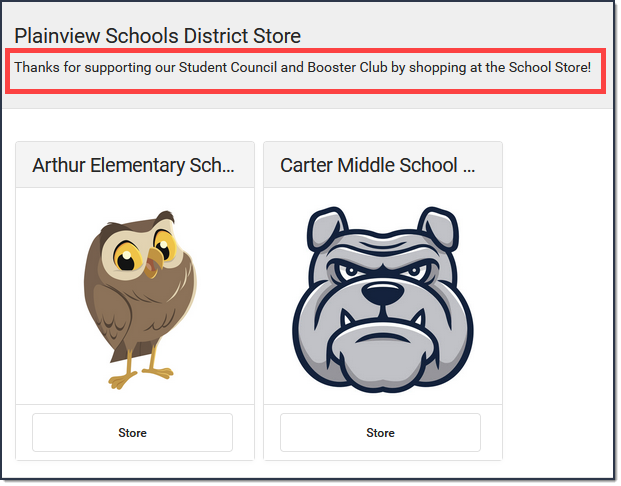 |
| Store Logo Upload | A picture that represents the Public Store. This image displays at top of the page. The image must use one of the following extensions: .jpg, .jpeg, .png, or .gif.  |
Step 6. Set up Categories
Tool Search: Categories
Categories are how similar products are grouped in the store. When a portal user selects a category, only the products assigned to that category display. Inactive categories and active categories with NO active products do not appear in the School Store.
- If you select All Schools in the Campus toolbar, the Categories for every school can be seen.
- If you set the Show Inactive toggle to ON, inactive Categories also display. Otherwise, when the toggle is set to OFF, only active Categories display. Inactive Categories can be deleted if there are no Products assigned.
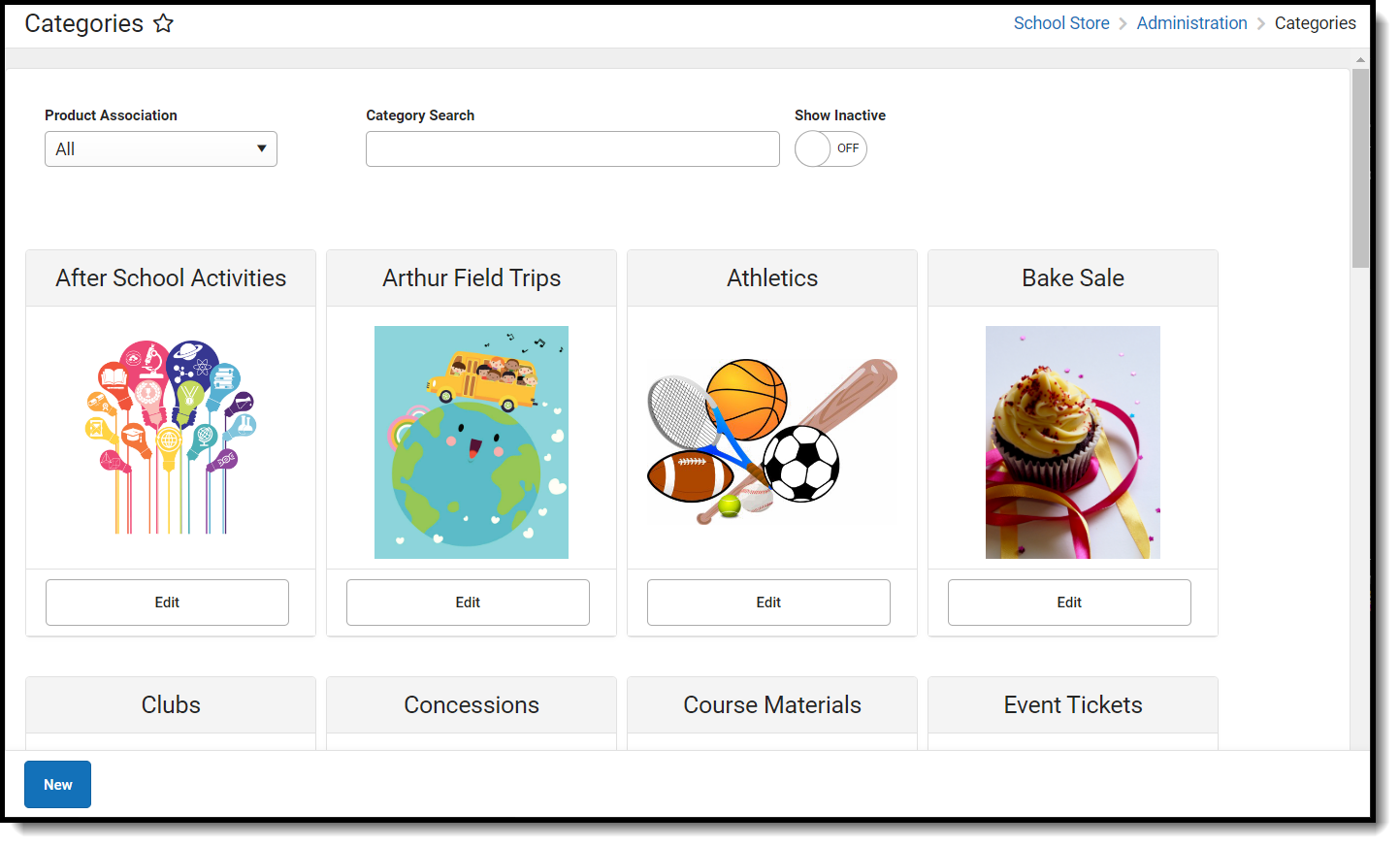
Create a New Category
- Select School Store > Administration > Categories.
Result
The Categories page displays.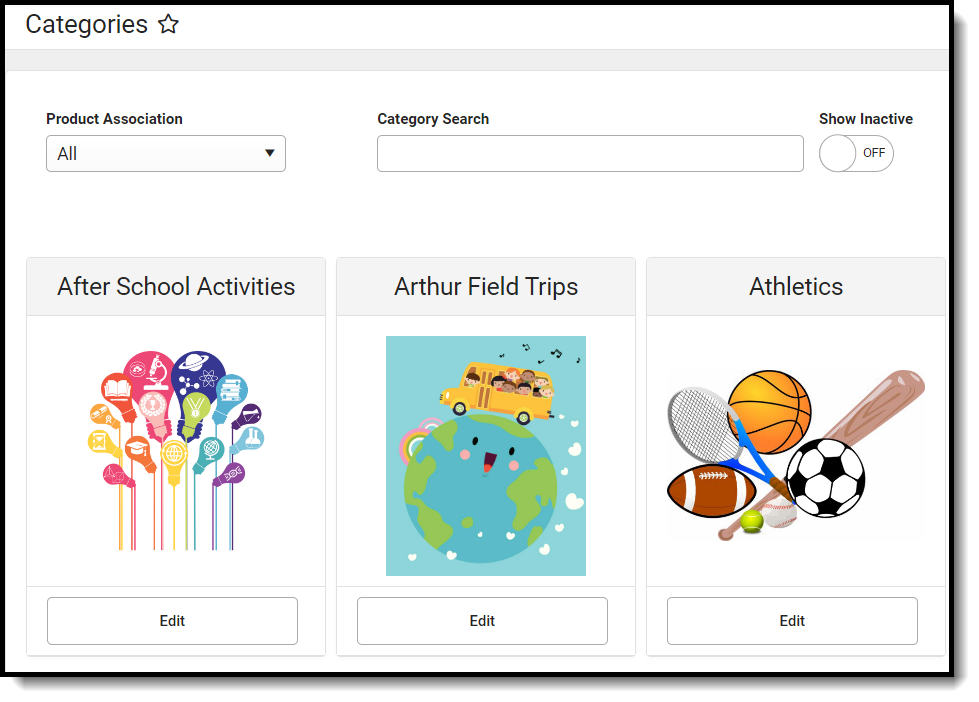
- Click New in the action bar.
Result
The Category panel displays. The Active checkbox and the Display On Portal checkbox are automatically selected.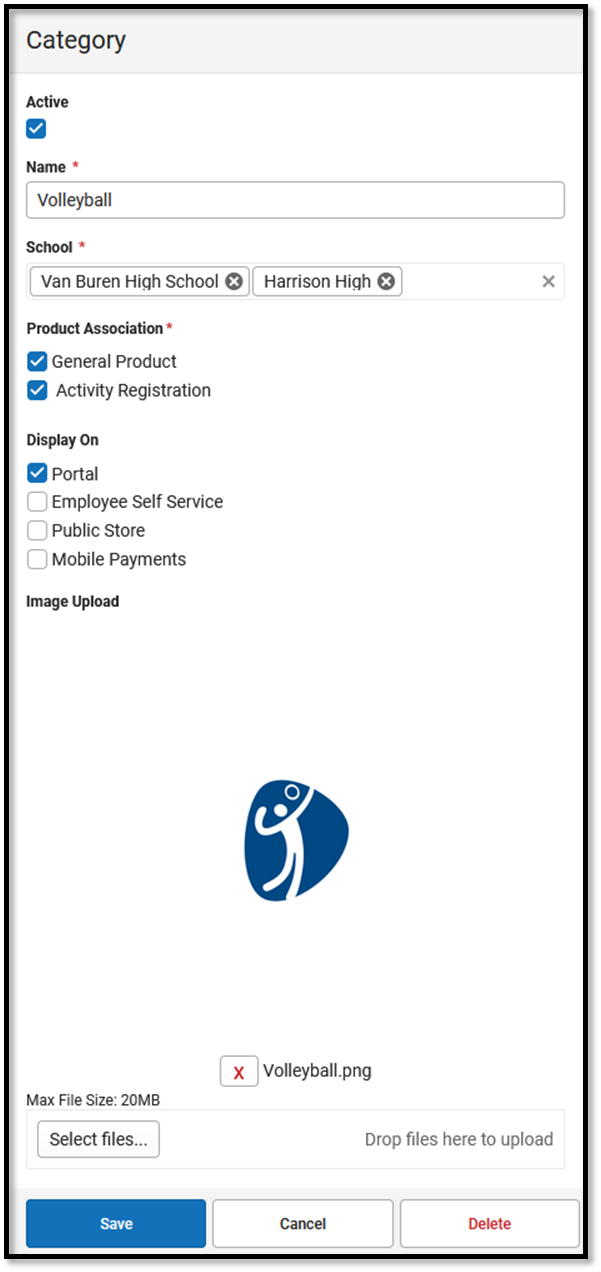
- Enter a Name for the category.
Select the Schools where the category will be available.
This field only displays schools you have tool rights to.Mark the appropriate Product Association checkboxes:
General Product - Mark this checkbox if the category will include products for purchase in the School Store.
Activity Registration - Mark this checkbox if the category will include activities for which students can register. When this checkbox is marked, Campus makes the category available for selection in the Activity Builder. If this checkbox is not marked, the category will not be available in the Activity Builder.
Mark the appropriate Display On checkboxes:
Portal
Tip: This checkbox is automatically selected on new Categories. Clear this checkbox if you do not want this Category to display in Campus Parent or Campus Student.Employee Self Service
Public Store
Mobile Payments
The options Employee Self Service, Public Store, and Mobile Payments must have General Product selected (under Product Association).
Use the Select Files option to upload an image for the category.
The image must use one of the following extensions: .jpg, .jpeg, .png, or .gif.
- Click Save.
Result
The Category is ready for you to add Products.
- if someone else wants to edit the School field on the Category, they must have tool rights to all of the assigned schools. Otherwise, they cannot make changes to the School field.
if you decide to inactivate a Category and active products are tied to the Category, Campus also inactivates the products and the products will not display in the School Store until they are manually made active again.
the Product Category is a required field on the Orders Report. If you remove a school from a Category, you will not be able to use the Orders Report for purchases made for that combination of Category and School.
Step 7. Set up Products
Tool Search: General Product
After Categories are set up, Products can be created using the Product progress tracker. The Product progress tracker includes the following three parts:
- 1 - Product
- 2 - Product Items
- 3 - Availability
To get started, select All Schools or a specific school in the Campus toolbar, then click the Products button on a Category. If you set the Show Inactive toggle to ON, inactive Categories also display. Otherwise, when the toggle is set to OFF, only active Categories display.
If you create a Product and decide you do not want it, you can delete the Product if it has never been purchased.
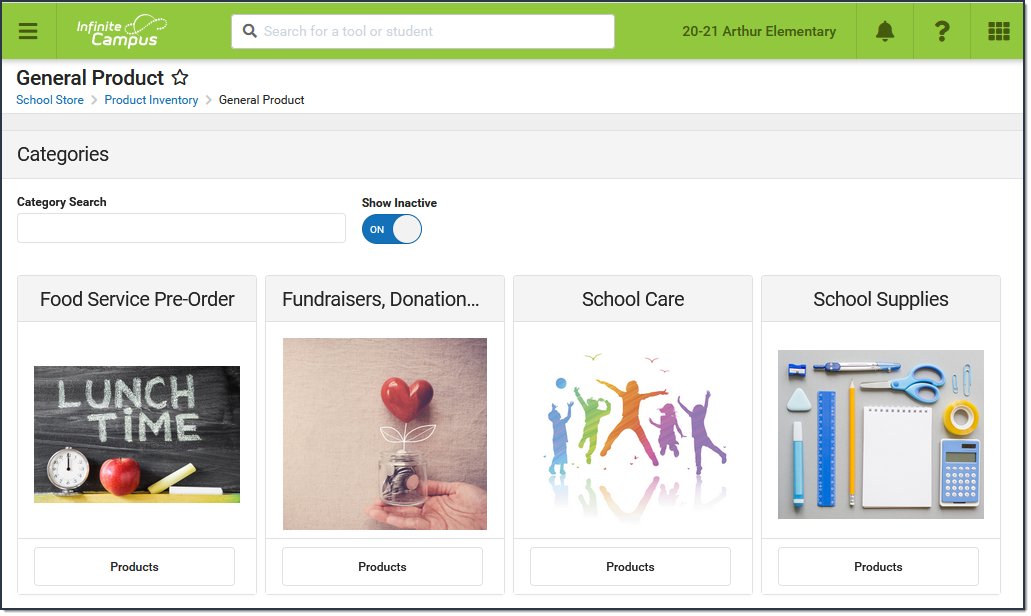
1 - Product
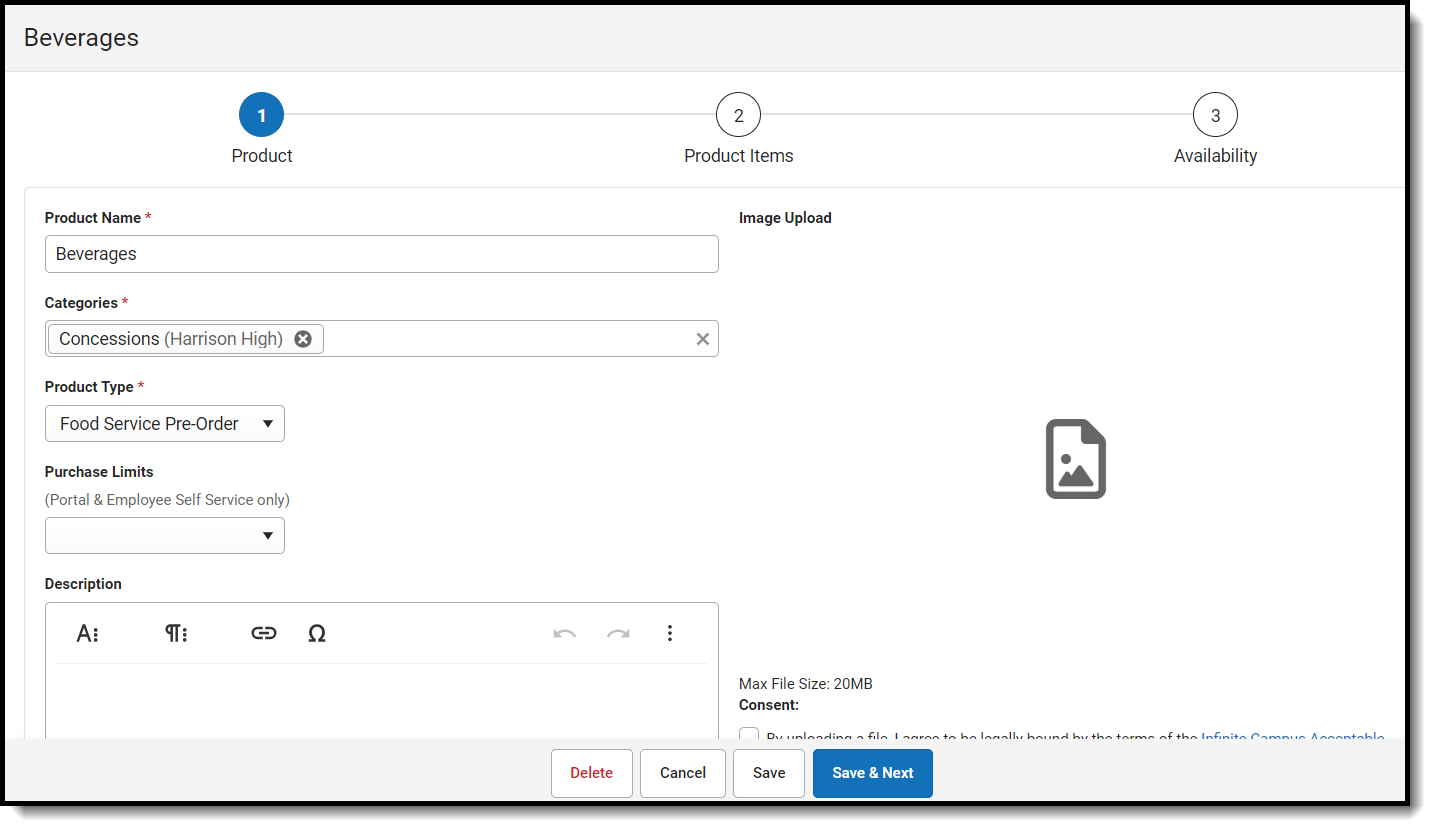
| Field | Description |
|---|---|
| Product Name | The name that displays in the School Store, Public Store, Employee Self Service, and/or Campus Mobile Payments. |
| Categories |
The Categories under which you want the Product to appear. You can select multiple Categories.
When you select a Category in School Store, Public Store, Employee Self Service, and/or Campus Mobile Payments, the assigned Products display.
The Products and Items associated with the Category are available for selection when setting up the Event Layout in School Store > Administration > Events.
The Product Category is a required field on the Orders Report. If you remove a school from a Category, you will not be able to use the Orders Report for purchases made for that combination of Category and School. |
| Product Type |
The Product Type to which you want to assign the Product. When this product is purchased, funds are deposited into the bank associated with the Product Type's Fund Account. |
| Purchase Limits |
Purchase Limits restrict the number of products or product items that can be bought for an individual recipient.
Purchase Limits can only be used in Parent Portal, Student Portal, and Employee Self Service. |
| Description | Detailed information about the product. This Description appears below the picture of the product. |
| Receipt Comments | This field allows for comments or special instructions to be added to a customer's receipt when the product is purchased. Comments appear below the purchased item.
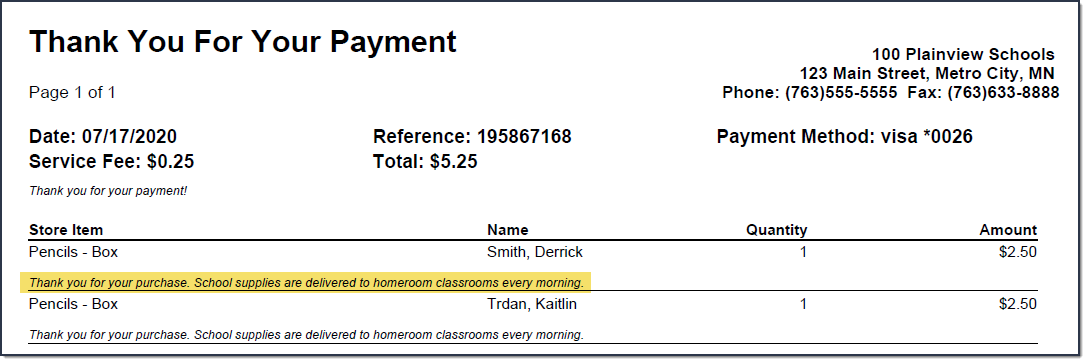 |
| Variable Rate | Mark this checkbox if you do not want to set a specific price for the item. When this checkbox is marked, the customer can enter any amount they want when they check out. This option is useful for things like donations. |
| Partial Refund | Mark this checkbox if you want to allow partial refunds for this item. |
| Inventory Tracking |
When this checkbox is marked, Campus calculates the amount of inventory you have available after a purchase is made. An additional column called Inventory on Hand displays on the Step 2 Attributes screen and allows you to manage the items in your store. If the number in this column is zero, Campus displays the message Out of Stock when the users try to add the item to their cart. Do NOT mark this option if
When this checkbox is marked, the product is included in the Inventory on Hand report. If you use the Payments Reporter to issue refunds for products purchased in the School Store and this checkbox is marked, Campus allows you to choose whether you want to return the item to Inventory on Hand. |
| Customer Comments |
When this checkbox is marked, customers can add information to their purchase before they check out. Comments appear on the Pick List report. You may enter text in the customer comment field to automatically display a message.
Customer Comments are not available in the Campus Mobile Payments app. |
| Description | Detailed information about the product. This Description appears below the picture of the product. |
| Image Upload | This option allows you to add a picture of the product.
The image must use one of the following extensions: .jpg, .jpeg, .png, or .gif. As a best practice, the file should not exceed 3MB. The image that displays in the store is a square, so a 1:1 aspect ratio is also recommended.
The uploaded images do not display in the Campus Mobile Payments app. |
| Image Description | After you select an image, an Image Description field appears. Use this field to enter a short text description of the image to be read aloud by screen readers, helping users with visual impairments understand what the image shows. |
| File Upload |
This option allows you to add a PDF file to the product. For example, pencils are going to be sold at a fundraiser, so a flyer about the fundraiser can be uploaded to the Pencils product.
A link to the PDF file displays between the image and the description.
The uploaded files do not display in the Campus Mobile Payments app. |
2 - Product Items
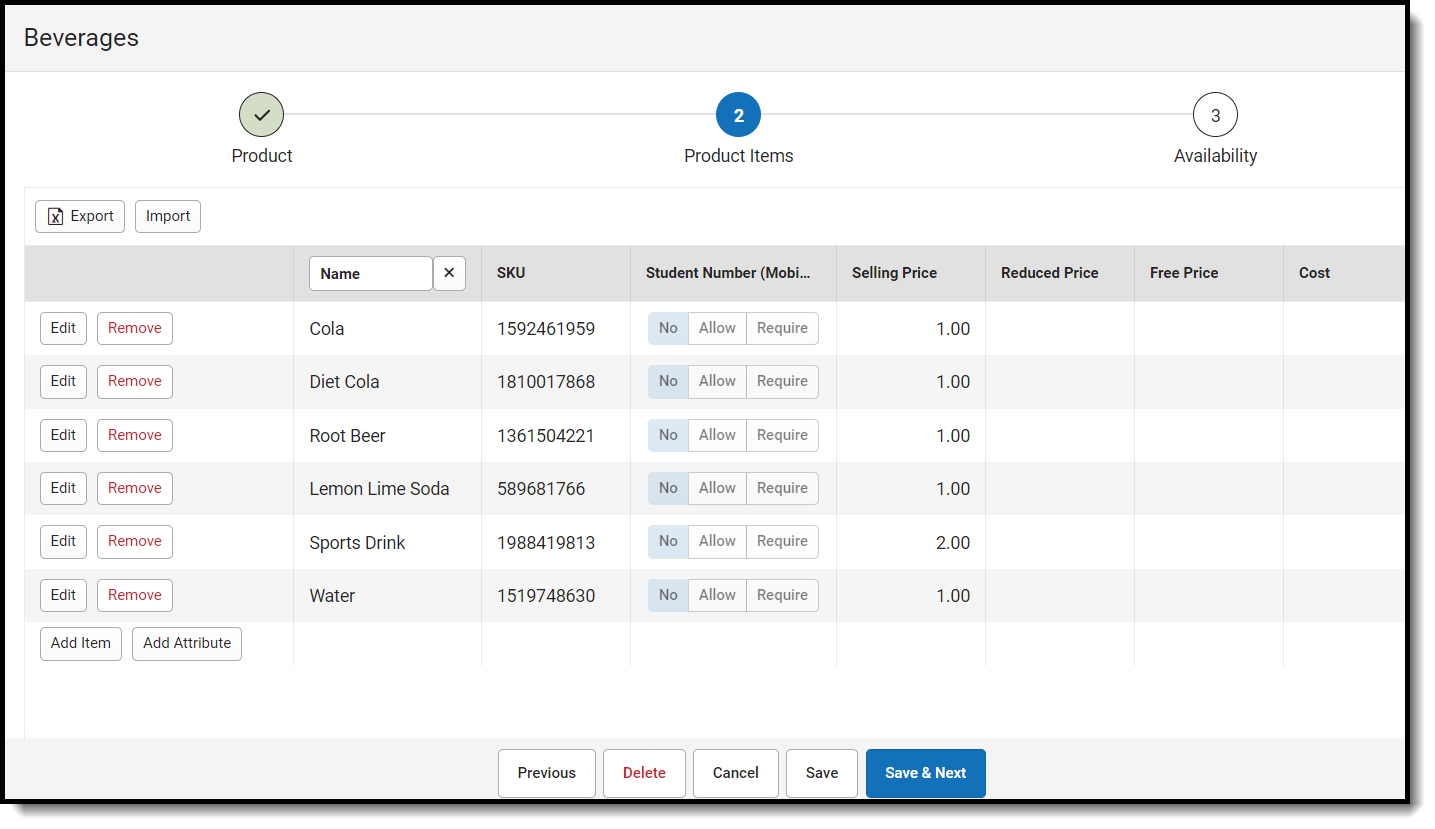
You can drag and drop rows to easily reorder lines in the table. To add multiple attributes (lines and rows) to the table, you must first click the Add Attribute button.
| Field | Description |
|---|---|
| Export | The Export button allows you to download an Excel version of the Product Items table. |
| Import |
The Import button allows you to upload an Excel or CSV file to populate the Product Items table.
To begin, use the Export button to download a template of the Product Items table.
|
| Add Item |
The Add Item button allows you to add another row to the table if you are using custom attributes. |
| Add Attribute | The Add Attribute button allows you to add custom attributes to the table. You can add up to three custom attribute columns for tracking additional product information. |
| Student Number (Mobile) | This column displays if Mobile Payments is marked within the Category under Display On.
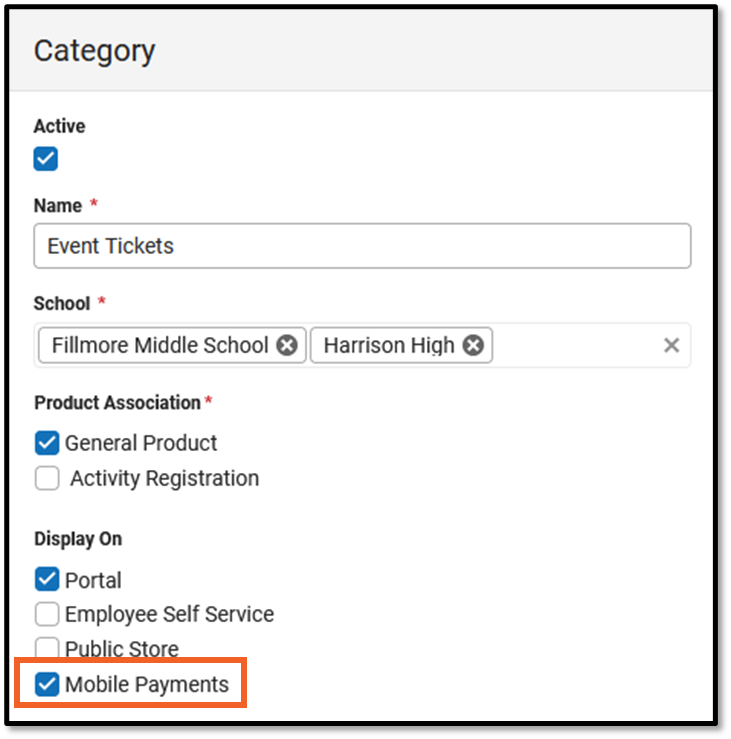 The Student Number (Mobile) field is used to track information about purchases for students. For example, if selling prom tickets, you may want to enter the student number at the time of purchase to track the students who are attending. The Student Number (Mobile) field is used to track information about purchases for students. For example, if selling prom tickets, you may want to enter the student number at the time of purchase to track the students who are attending.
When a row is added in Step 2 Product Items, the Student Number (Mobile) column displays three options:
The Student Number (Mobile) column appears in the Campus Mobile Payments app only. |
| SKU |
You can enter your own SKU or one from a vendor. If you leave this field blank, Campus assigns a unique, system generated number. Infinite Campus recommends using unique SKUs for each product. |
| Inventory on Hand |
This column only displays if Inventory Tracking is selected in Step 1 Product. This is the total amount of inventory on hand. You can manually update this number at any time. If the number in this column is zero, Campus displays the message Out of Stock when the user tries to add the item to their cart. |
| Selling Price | The price customers pay and see in the store. The price can be $0.00.
Items that cost $0 cannot be purchased through the Public Store. |
| Reduced Price |
The price students with a Reduced eligibility status whose guardians have given permission to share it with the School Store and Activity Registration pay and see in the School Store. The price can be $0.00. |
| Free Price | The price students with a Free eligibility status whose guardians have given permission to share it with the School Store and Activity Registration pay and see in the School Store. The price can be $0.00. |
| Cost | The price the district paid to purchase the product from the vendor. This field is optional. |
| Purchase Limit | This column only displays if you chose Purchase Item in the Product Limits dropdown list (Part 1 of the Product Progress Tracker). Enter the maximum number of this particular item the user is allowed to purchase for a recipient. |
3 - Availability
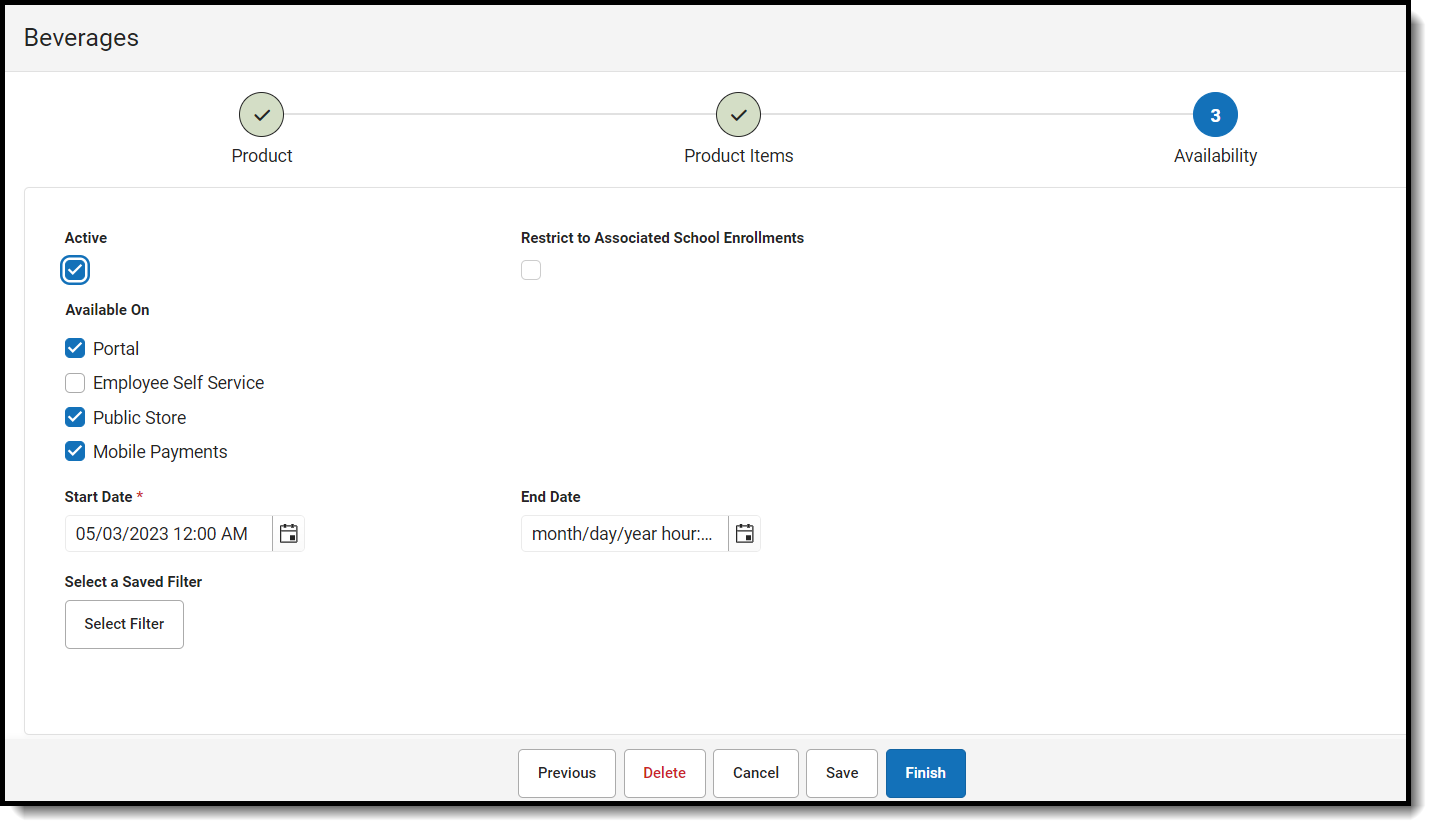
| Field | Description |
|---|---|
| Active | When this checkbox is marked, the product is available on the Start Date in the store(s) marked in the Available On section. |
| Restrict to Associated School Enrollments | When this checkbox is marked, the Recipient dropdown list in the School Store will only display students who have an enrollment in the active school year at the school to which the product is attached. This includes primary, secondary, and enrollments with a future end date.
Example If you have a Product attached to the High School only and this checkbox is marked, parents will only be able to select their student(s) with primary and secondary High School enrollments in the active school year as well as enrollments with a future end date. Please note that if the same Product is associated with multiple schools; e.g., a middle school and a high school, parents can select both middle and high school students in both stores. This option is only available when the product is only available on the Portal. If the Employee Self Service, Public Store, or Mobile Payments checkboxes are also selected, this field is disabled. |
| Include Future Enrollment | When Restrict to Associated School Enrollments has been selected, allows future enrolled students to purchase the item. If selected, the Days Before Enrollment field will appear. This allows users to set the number of days before the enrollment start date the product will be available for purchase. The maximum number of days is 365. |
| Available On |
|
| Start Date |
The first day and time on which the product may be purchased. This field is required. Campus verifies the Product Type and Category are active on the same day or prior. |
| End Date | The last day and time on which the product may be purchased. After this date and time, the product is inactive and is not available in the store. |
| Purchase Limit | This field only displays if you chose Product in the Product Limits dropdown list (Part 1 of the Product Progress Tracker). Enter the maximum number the user is allowed to purchase for a recipient from that product group. For example, if the Product Limit is set to 3 for School Supplies, this means you can purchase any3 items from the School Supplies product group.
Purchase Limits can only be used in Parent Portal, Student Portal, and Employee Self Service.
|
| Select a Saved Filter |
This option allows you to select an Ad Hoc filter to limit purchasing to the people included in the filter. Only people who are included in the Ad Hoc filter and have an active enrollment in the active calendar year can be selected as a Recipient.
See the Ad Hoc Filter Examples for more information.
Select a Saved Filter is only available when Portal is selected from the Available On section. If the Employee Self Service, Public Store, or Mobile Payments checkboxes are also selected, Ad Hoc filters cannot be applied. |
Ad Hoc Filter Examples
Classic View: Ad Hoc Reporting > Filter Designer > Query Wizard > Student
You can create an Ad Hoc filter to limit purchasing to specific people. Only people who are included in the Ad Hoc filter and have an active enrollment in the active calendar year can be selected as a Recipient when a purchase is made.
The Ad Hoc filter must always include the Person ID: Student > Demographics > Person ID (student.personID)
Filter for Students with a Parent Consent of Yes
This filter restricts purchasing to students who have a parent consent of yes on their Athletics record.
- Student > Demographics > Person ID: student.personID
- Student > Activities > Athlete Eligibility > parentConsent: ath.parentConsent
| Field | Operator | Value |
|---|---|---|
| ath.parentConsent | = | Y |
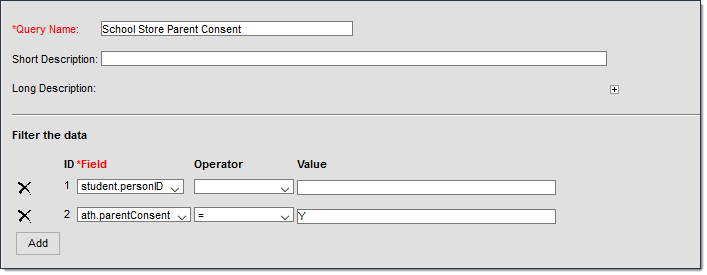
Ad Hoc Query Example
Filter for Students with an Active Physical Form
This filter restricts purchasing to students who have an active physical on record.
- Student > Demographics > Person ID: student.personID
- Student > Activities > Athlete Eligibility > physicalDate: ath.physicaldate
- Student > Activities > Athlete Eligibility > physicalEndDate: ath.physicalenddate
| Field | Operator | Value |
|---|---|---|
The values provided here are applicable for the 2019/2020 school year. Modify these dates as necessary or use the IS NOT NULL Operator. | ||
| ath.physicaldate | > | 09/01/2019 |
| ath.physicalenddate | < | 09/01/2021 |
 Ad Hoc Query Example
Ad Hoc Query Example
Refunds
- Use the Payments Reporter to issue refunds for products purchased in the School Store.
- If the Inventory Tracking checkbox is marked on the product, Campus automatically updates the Inventory on Hand to include the refunded item.
- You cannot perform a Partial Refund for products purchased in the School Store.




